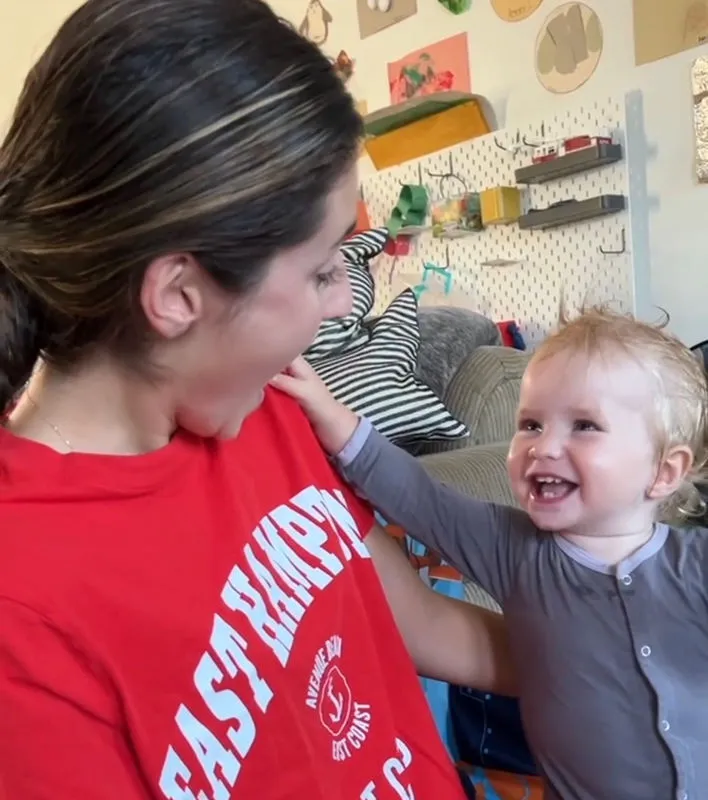Singing To Babies

Why Singing to Your Baby Is One of the Best Things You Can Do—And How Au Pairs Make It Even Better
Singing to Your Baby Helps Them Feel Calmer and Happier
Parents of newborns know that fussy days happen. Did you know that singing to babies provides many amazing benefits – from an overall happier baby to supporting cognitive and developmental milestones!
A study from the Yale Child Study Center found that babies who were sung to more frequently were calmer overall—not just in the moment, but throughout the day. In this study, parents were encouraged to sing simple folk songs to their 3- to 6-month-old babies. Those who did noticed a real shift in their babies’ moods. Babies who heard more singing were less fussy and more content.
Dr. Samuel Mehr, one of the researchers, noted: “The babies’ mood improved overall as a result of the intervention. It’s not that their mood increased due to the singing right then and there—it improved over time.”
In other words, singing to your baby isn’t just soothing in the moment. It’s helping your baby feel more secure, connected, and emotionally balanced day after day.
.webp)
Singing Boosts Baby’s Brain and Language Skills
Besides helping your baby feel calm and happy, singing also builds important early skills—especially in language.
When you sing to your baby, you naturally slow down your speech, repeat words, and use rhythm and melody. All of this helps your baby process and learn language more effectively. According to the National Association for the Education of Young Children (NAEYC), singing to your baby can help:
- Improve listening and attention span
- Learn new words and sounds
- Recognize the structure of language
- Build memory and pattern recognition
And the research backs it up. A study published in the Journal of Child Language found that babies who were sung to more often developed larger receptive vocabularies by 14 months. So when you’re singing to your baby, you’re doing more than entertaining them—you’re helping wire their brain for communication.

Singing in Different Languages? Even Better!
Now imagine all those benefits—plus the added bonus of introducing your baby to a second language. That’s exactly what happens when your au pair sings songs in their native tongue.
Babies are amazing at picking up languages. In fact, researchers say that babies are born ready to learn any language in the world. By around 6 to 8 months, they begin to tune into the sounds they hear most often. So, the earlier your baby hears another language, the more easily they’ll be able to learn it later in life.
Multilingual singing has specific benefits:
- It introduces babies to new rhythms and sound patterns
- It supports brain flexibility (neuroplasticity) and early bilingualism
- It helps develop cultural awareness from a young age
- It adds variety and fun to everyday routines
A 2023 article in The Guardian emphasized how singing to babies in any language helps them understand language structure, even before they speak. Having multilingual family members, or if you’re hosting an au pair for childcare, they can help support your baby grow towards their developmental and linguistic milestones.
How AuPairCare Au Pairs Make Singing to Baby Part of Everyday Life
At AuPairCare, we see singing as one of the many ways au pairs help children thrive. Because au pairs live with your family, they naturally become a part of your child’s daily rhythm—bringing music, language, and culture into even the simplest moments.
Whether they’re:
- Singing a cultural lullaby at nap time
- Leading a sing-along during playtime
- Sharing songs from their home country
- Teaching your baby greetings through music
…they’re helping your child build emotional bonds, early language skills, and a global mindset. And because au pairs come from over 40 countries, your child may be introduced to multiple languages and cultures—all from the comfort of your own home.
Everyday Ways to Start Singing to Your Baby
Not sure where to start? You don’t need to be a professional singer—your baby loves your voice the most. Try incorporating these simple ideas:
- Morning song: Greet the day with a cheerful tune
- Clean-up song: Use music to transition between activities
- Bath time melody: Sing about splashing, bubbles, or body parts
- Bedtime lullaby: Create a calming nighttime routine
.webp)
Different Songs to Sing to Your Baby:
Twinkle, Twinkle, Little Star
Lyrics:
Twinkle, twinkle, little star
How I wonder what you are
Up above the world so high
Like a diamond in the sky
Twinkle, twinkle, little star
How I wonder what you are
Rock-a-Bye Baby
Lyrics:
Rock-a-bye baby on the treetop
When the wind blows, the cradle will rock
When the bough breaks, the cradle will fall
And down will come baby, cradle and all
Hush, Little Baby
Lyrics:
Hush, little baby, don't say a word
Mama's gonna buy you a mockingbird
And if that mockingbird won't sing
Mama's gonna buy you a diamond ring
... (continues with various promises)
Brahms’ Lullaby (Cradle Song)
Lyrics:
Lullaby and goodnight, with roses bedight
With lilies o'er spread is baby's wee bed
Lay thee down now and rest, may thy slumber be blessed
Lay
International Songs An Au Pair Can Sing:
Mexico: Arrorró Mi Niño
Arrorró mi niño,
arrorró mi sol,
arrorró pedazo
de mi corazón
Este niño lindo
ya quiere dormir,
háganle la cuna
de rosa y jazmín
English Translation:
Hush-a-bye my baby,
hush-a-bye my sun,
hush-a-bye piece
of my heart
This beautiful child
wants to sleep now,
make him a cradle
of roses and jasmine.
Germany: Guten Abend, Gute Nacht
Guten Abend, gute Nacht,
mit Rosen bedacht,
mit Näglein besteckt,
schlupf unter die Deck’.
Morgen früh, wenn Gott will,
wirst du wieder geweckt.
English Translation:
Good evening, good night,
with roses covered,
with carnations adorned,
slip under the blanket.
Tomorrow morning, if God wills,
you will wake once again.
Colombia: Duérmete niño
Duérmete niño
Duérmete tú
Antes que venga
El currucutú.
Duérmete niño
Duérmete tú
Antes que venga
El guanaguana
Qui-qui-ri-qui.
English Translation:
Go to sleep child,
Go to sleep, you,
Before the
Screech owl comes.
Go to sleep child,
Go to sleep, you,
Before the
Black skimmer bird comes,
Caw, caw, caw, caw.
France: Aujourd'hui jeudi
Aujourd'hui jeudi
C'est la fête à la souris
Elle balaie son tapis
Elle trouve une pomme d'api
La coupe et la cuit
Et la donne à ses petits.
English Translation:
Today, Thursday,
It's the mouse's day.
She sweeps her carpet,
She finds a Lady Apple*,
Cuts it and cooks it
And gives it to her babies.
Brazil: Todos os patinhos
Todos os patinhos
Sabem bem nadar,
Sabem bem nadar,
Cabeça para baixo,
Rabinho para o ar,
Cabeça para baixo,
Rabinho para o ar.
Quando estão cansados,
Da água vão sair,
Da água vão sair,
Depois em grande fila
P'ró ninho querem ir,
Depois em grande fila
P'ró ninho querem ir.
English Translation:
All the ducklings
Know how to swim,
Know how to swim,
Head down,
Little tail up,
Head down,
Little tail up.
When they're tired,
They come out of the water,
They come out of the water,
Then in a long line,
They want to return to their nest,
Then in a long line,
They want to return to their nest.
And don’t be afraid to ask your au pair to teach you a few songs from their culture! It’s a great way to bond as a family while sharing meaningful traditions.
The Takeaway
Singing to your baby is one of the easiest, most joyful ways to support their development. It helps them feel safe, promotes language skills, and strengthens your connection. A way to further enhance this benefit for your baby can be through hosting an au pair with AuPairCare! When you become a host family, you gain more than just childcare—you welcome a world of music, language, and cultural exchange into your home. And that kind of harmony lasts a lifetime.
Request More Information














